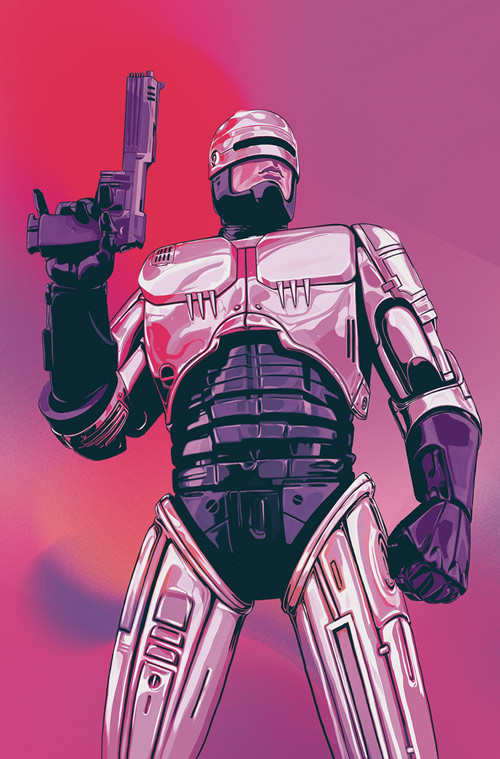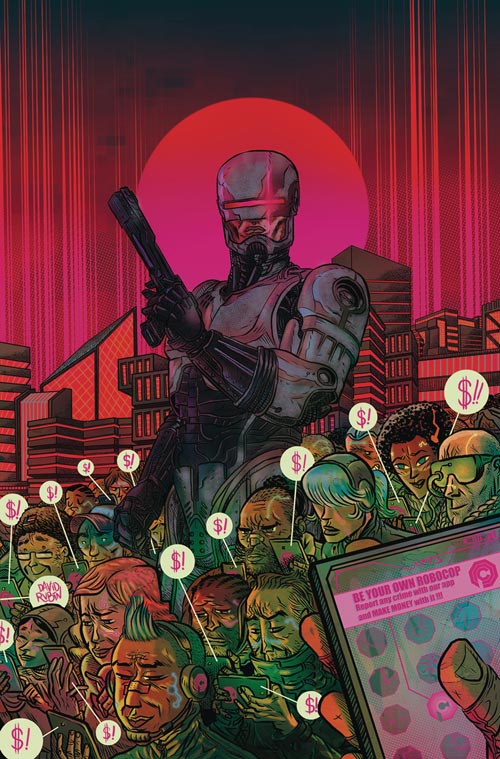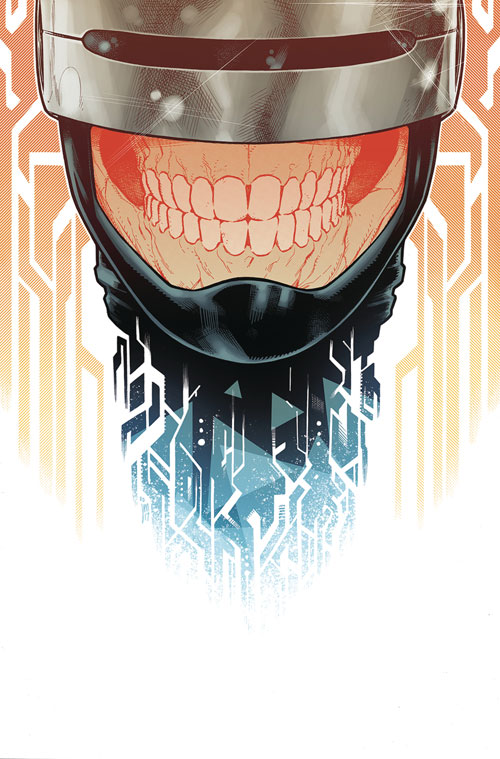RoboCop Paradise At The Price Of Paranoia
Apr 04, 2018
 |
by Vince Brusio
No one wants to see innocent people killed in a crossfire when drug gangs go at it with little regard for bystanders. And everyone wants somebody to do something about it. So when something is done, is it what you want? What’s the price for making things better? Brian Wood asks those questions in his new RoboCop Citizen’s Arrest #1 (FEB181185) for BOOM! Studios, and we talk to the writer about his new book in this PREVIEWSworld Exclusive interview!
RoboCop Citizen’s Arrest #1 (FEB181185) is in comic shops April 11.
**********
Vince Brusio: The title of the series is “Citizens Arrest,” and it ties into the idea that justice is now “crowdsourced.” So does this mean that — in the future — a day in the life is to see a monthly Kickstarter launched for wasting street gangs? Are those the facts on the ground?
Brian Wood: That's not what's happening in this series, no. It's more of a "if you see something say something" idea with a cynical edge, a monetized edge. The population of New Detroit has been given, thanks to this new iteration of OCP, a financial incentive to not only report crimes, but to seek out crimes to report. And how small a jump is that to setting up your neighbor for a quick buck?
Vince Brusio: Ok, so let’s examine the tag line for this series: “See Something. Say Something. Shoot Something.” That’s pretty direct. But life isn’t direct. It’s grey, not black and white. What’s happening on the front lines culturally in the world of RoboCop? We get the sense from the book’s solicitation that there are plenty of people who are all-in for taking out the garbage. But are there voices who say the smell of it wasn’t so bad, and we should just deal with it?
Brian Wood: The series is set about twenty years after the first RoboCop film, and it’s very much a near future world where everything's been pushed to an extreme, everything is recognizable, but right on the edge. A new OCP is here to buy up and privatize all city services – from government to fire to the police – and is doing what needs doing to prove its concept, to deliver the right numbers for the sake of its bottom line. And, in time, to franchise it out to other cities. And, hey, it’s turned Detroit around, with its massive army of AI law enforcement, a compliant public, and a city that feels reborn. But, you know, at what cost? If someone's winning, who's losing?
Vince Brusio: So the bleak picture in front of us, in part, is that corporations have taken over the schools and government. There are obviously people working day-to-day to keep this machine running, so who are they? What are their names? Are they sell-outs? Do they have souls? Are you drawing a parallel?
Brian Wood: I like Detroit, the actual city. But in RoboCop, and to quote our president, it’s always shown to be something of a sh**hole. But imagine you are a citizen and have watched OCP come in, clean up the place, get rid of crime, modernized its public transit, pumped a ton of money into schools, and the whole city center is new and modern and safe and you don't worry about walking around at night and your property value is way up... isn't it easy to get on board with that? Even if you understand that maybe the more marginalized communities in the outskirts don't have it so good, isn't it easy to just not think too hard about it?
Vince Brusio: Why was Jorge Coelho tapped as the artist for this book? Why was he the right fit? What does he bring to the table when he has to show a world, a people, injustice, and judgment?
Brian Wood: Writers get questions like this a lot, and at their core it’s always about one thing: Jorge is an amazing artist and designer and storyteller, that's what he brings to the table. I'm blessed to have him working on this story.
Vince Brusio: One of the last insights we get into this world that is home to RoboCop: Citizens Arrest is that citizens are encouraged to spy on their neighbors. This type of self-policing isn’t new to someone from a communist country. It was considered standard protocol if you lived back in the time of the old Soviet Union. Did you interview or talk to people who come from these kinds of cultural backgrounds? How did you put your finger on the pulse of paranoia for the people in Citizens Arrest? And how does this type of street justice change morality of people in the book? What does it do to their humanity?
Brian Wood: The self-reporting element is important to the story, but it’s a brick in the wall that is this new OCP. What "RoboCop" is now is a fleet of machines, AI-driven drones, tanks, and troops. It's also passive 'watcher' robots, self-driving police cruisers, all sorts of surveillance, EMT, Fire, education, construction... it’s a whole approach that puts the lives of the city in the hands of OCP. Having citizens so distrustful of each other is a way that enables OCP to hold on to that power.
For all this talk about OCP and privatization, we're skipping over RoboCop himself, the OG RoboCop, Alex Murphy. This new OCP, doing everything under the name and branding of Robocop, you think Alex is going to just let that go? Not if he can help it. And this young ex-police officer that is at the center of the story - Leo Reza - he goes looking for Alex to try and make that happen.
This series is dense and rich and political and satirical, and I'm pouring all my energy into these scripts. I think you'll love it.
 |
 |
**********
Vince Brusio writes about comics, and writes comics. He is the long-serving Editor of PREVIEWSworld.com, the creator of PUSSYCATS, and encourages everyone to keep the faith...and keep reading comics.




